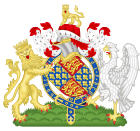Englishry facts for kids
Englishry, also known as Englescherie in Old French, was a special legal rule in medieval England. It was used to figure out if a person was an Englishman (someone from the native Anglo-Saxon people) or a Norman (part of the ruling class after the Norman Conquest).
Specifically, presentment of Englishry meant proving that a person who had been killed was an Englishman, not a Norman. If an unknown man was found dead, the law assumed he was a Norman. Because of this, the local area, called a hundred, would have to pay a large fine. This fine was only excused if the people in the hundred could prove that the dead person was actually English.
Where Englishry Came From
Historians believe that this practice might have first been used by Danish invaders in England. Later, the Norman conquerors kept it going and made it a regular part of their laws. Some experts, like W. Stubbs, suggest that even King Canute might have had similar rules.
However, this rule isn't mentioned in some of the very first books about medieval English law, like "Glanvill's treatise." The first clear record of Englishry appears in a legal book from the 13th century called De Legibus, written by Bracton. People often tried very hard to prove that a person who had been killed was English, especially if they were thought to be Norman, to avoid paying the heavy fines.
When Englishry Ended
| Act of Parliament | |

|
|
| Long title | Presentment of Engleschrie shall be clearly extirpate. |
|---|---|
| Citation | 14 Edw. 3 Stat. 1. c. 4 |
| Dates | |
| Commencement | 21 February 1340 |
| Other legislation | |
| Repealed by |
|
| Text of statute as originally enacted | |
The practice of Englishry was officially stopped by a law called the Engleschrie Act 1340. This law was passed by the Parliament of England. Later, this Act itself was removed from the law books by other laws in 1863 and 1872.
Even though it became very difficult to tell Normans and Englishmen apart after about 200 years, the rule of Englishry continued. This was because it was very profitable for the King. Only a small part of the fine collected actually went to the family of the person who was killed; most of it went to the Crown.
See also
- Murdrum

